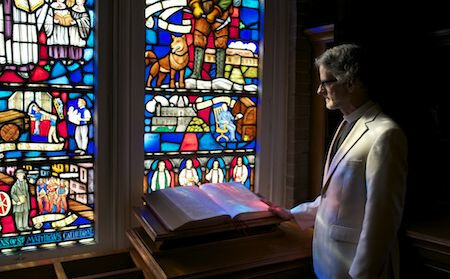The Song of Songs

I’ll start with the conclusion. Contrary to all expectation, and despite its appearance as something that doesn’t fit with the rest of Scripture, the Song of Songs is in the Old Testament as the key to reading the entire Old Testament—and by extension, for Christians, the entire Bible.
The Song of Songs is, I believe, an intentional allegory. That is to say, the literal meaning is the allegory; it is not an independent love story upon which an allegorical meaning has been laid. The arguments for this are made by, e.g., Robert Jenson in his commentary on the book (Westminster/John Knox; short and affordable) and by Edmee Kingsmill in her remarkably readable scholarly study, The Song of Songs and the Eros of God (Oxford; unfortunately, quite expensive).
The message of the book is thus that God is in love with us, that he has chosen us and desires us. That message does indeed run through the Bible, and once you grasp the point, you will start to see it everywhere.
I am writing these words on the morning of November 28. In this morning’s Psalms (I use the old 30-day calendar, so they are Psalms 132–135), I noticed this: “For the LORD hath chosen Sion to be an habitation for himself; he hath longed for her” (Ps. 132:14). The words leapt off the page; I must have read them a hundred times before, and not noticed. First is God’s choice, a choice for which there is no reason! God just has chosen Israel to love her (and Zion to be the place where he dwells in order to love her), and he has chosen us in Christ Jesus to love us as well, not because we are good or worthy, and not for any other reason. God’s choice is just his choice; there is nothing behind it.
And second, the verse goes on to say: “he hath longed for her”! God longs for us—as the groom longs for his bride, as it is set forth with aching beauty in the Song of Songs.
As we enter this season of waiting, may we experience it as a season of longing. Our hearts and souls and bodies yearn for God as for nothing else. And the great mystery at the heart of the universe is this: God also is yearning for us.
---
Out & about. I am teaching a course on the Song of Songs this Advent at Church of the Incarnation, 3966 McKinney, Dallas. The class is on Sundays at 10:20 in the Memorial Chapel. I always find the “live” class to be the best experience, but if you can’t be with me, you can listen to the class when it is posted on this page: https://incarnation.org/class-recordings/.

